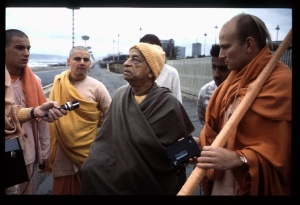CC Antya 2.118: Difference between revisions
m (1 revision(s)) |
(Vanibot #0054 edit - transform synonyms into clickable links, which search similar occurrences) |
||
| (One intermediate revision by one other user not shown) | |||
| Line 1: | Line 1: | ||
{{ | [[Category:Sri Caitanya-caritamrta - Antya-lila Chapter 02|C118]] | ||
<div style="float:left">'''[[Sri Caitanya-caritamrta|Śrī Caitanya-caritāmṛta]] - [[CC Antya|Antya-līlā]] - [[CC Antya 2|Chapter 2: The Chastisement of Junior Haridāsa]]'''</div> | |||
<div style="float:right">[[File:Go-previous.png|link=CC Antya 2.117|Antya-līlā 2.117]] '''[[CC Antya 2.117|Antya-līlā 2.117]] - [[CC Antya 2.119|Antya-līlā 2.119]]''' [[File:Go-next.png|link=CC Antya 2.119|Antya-līlā 2.119]]</div> | |||
{{CompareVersions|CC|Antya 2.118|CC 1975|CC 1996}} | |||
{{RandomImage}} | |||
==== TEXT 118 ==== | ==== TEXT 118 ==== | ||
<div class="verse"> | |||
<div | :durvāra indriya kare viṣaya-grahaṇa | ||
durvāra indriya kare viṣaya-grahaṇa | :dāravī prakṛti hare munerapi mana | ||
dāravī prakṛti hare munerapi mana | |||
</div> | </div> | ||
| Line 13: | Line 16: | ||
==== SYNONYMS ==== | ==== SYNONYMS ==== | ||
<div class="synonyms"> | |||
<div | ''[//vanipedia.org/wiki/Special:VaniSearch?s=durvāra&tab=syno_o&ds=1 durvāra]'' — uncontrollable; ''[//vanipedia.org/wiki/Special:VaniSearch?s=indriya&tab=syno_o&ds=1 indriya]'' — the senses; ''[//vanipedia.org/wiki/Special:VaniSearch?s=kare&tab=syno_o&ds=1 kare]'' — do; ''[//vanipedia.org/wiki/Special:VaniSearch?s=viṣaya&tab=syno_o&ds=1 viṣaya]-[//vanipedia.org/wiki/Special:VaniSearch?s=grahaṇa&tab=syno_o&ds=1 grahaṇa]'' — accepting sense objects; ''[//vanipedia.org/wiki/Special:VaniSearch?s=dāravī&tab=syno_o&ds=1 dāravī] [//vanipedia.org/wiki/Special:VaniSearch?s=prakṛti&tab=syno_o&ds=1 prakṛti]'' — a wooden statue of a woman; ''[//vanipedia.org/wiki/Special:VaniSearch?s=hare&tab=syno_o&ds=1 hare]'' — attracts; ''[//vanipedia.org/wiki/Special:VaniSearch?s=munerapi&tab=syno_o&ds=1 munerapi]'' — even of a great sage; ''[//vanipedia.org/wiki/Special:VaniSearch?s=mana&tab=syno_o&ds=1 mana]'' — the mind. | ||
</div> | </div> | ||
| Line 21: | Line 23: | ||
==== TRANSLATION ==== | ==== TRANSLATION ==== | ||
<div class="translation"> | |||
<div | "So strongly do the senses adhere to the objects of their enjoyment that indeed a wooden statue of a woman attracts the mind of even a great saintly person. | ||
</div> | </div> | ||
| Line 29: | Line 30: | ||
==== PURPORT ==== | ==== PURPORT ==== | ||
<div class="purport"> | |||
<div | |||
The senses and the sense objects are so intimately connected that the mind of even a great saintly person is attracted to a wooden doll if it is attractively shaped like a young woman. The sense objects, namely form, sound, smell, taste and touch, are always attractive for the eyes, ears, nose, tongue and skin. Since the senses and sense objects are naturally intimately related, sometimes even a person claiming control over his senses remains always subject to the control of sense objects. The senses are impossible to control unless purified and engaged in the service of the Lord. Thus even though a saintly person vows to control his senses, the senses are still sometimes perturbed by sense objects. | The senses and the sense objects are so intimately connected that the mind of even a great saintly person is attracted to a wooden doll if it is attractively shaped like a young woman. The sense objects, namely form, sound, smell, taste and touch, are always attractive for the eyes, ears, nose, tongue and skin. Since the senses and sense objects are naturally intimately related, sometimes even a person claiming control over his senses remains always subject to the control of sense objects. The senses are impossible to control unless purified and engaged in the service of the Lord. Thus even though a saintly person vows to control his senses, the senses are still sometimes perturbed by sense objects. | ||
</div> | </div> | ||
__NOTOC__ | |||
<div style="float:right; clear:both;">[[File:Go-previous.png|link=CC Antya 2.117|Antya-līlā 2.117]] '''[[CC Antya 2.117|Antya-līlā 2.117]] - [[CC Antya 2.119|Antya-līlā 2.119]]''' [[File:Go-next.png|link=CC Antya 2.119|Antya-līlā 2.119]]</div> | |||
__NOTOC__ | |||
__NOEDITSECTION__ | |||
Latest revision as of 20:12, 19 February 2024

A.C. Bhaktivedanta Swami Prabhupada
TEXT 118
- durvāra indriya kare viṣaya-grahaṇa
- dāravī prakṛti hare munerapi mana
SYNONYMS
durvāra — uncontrollable; indriya — the senses; kare — do; viṣaya-grahaṇa — accepting sense objects; dāravī prakṛti — a wooden statue of a woman; hare — attracts; munerapi — even of a great sage; mana — the mind.
TRANSLATION
"So strongly do the senses adhere to the objects of their enjoyment that indeed a wooden statue of a woman attracts the mind of even a great saintly person.
PURPORT
The senses and the sense objects are so intimately connected that the mind of even a great saintly person is attracted to a wooden doll if it is attractively shaped like a young woman. The sense objects, namely form, sound, smell, taste and touch, are always attractive for the eyes, ears, nose, tongue and skin. Since the senses and sense objects are naturally intimately related, sometimes even a person claiming control over his senses remains always subject to the control of sense objects. The senses are impossible to control unless purified and engaged in the service of the Lord. Thus even though a saintly person vows to control his senses, the senses are still sometimes perturbed by sense objects.